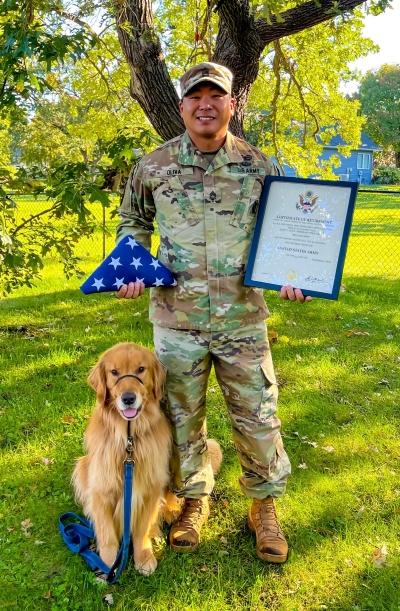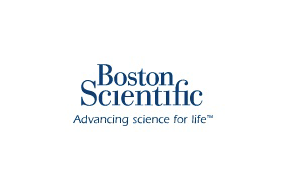A Life of Service - As a Soldier, a Veteran and at Boston Scientific
Published 11-18-22
Submitted by Boston Scientific

Sean always felt a strong drive to serve his country. He cites three influences for his patriotism: his grandfathers, who fought in World War II; his gratitude at having been adopted from South Korea as a baby; and 9/11, which hit home for Sean in more ways than one.
“My mother worked in the World Financial Center, directly next to the World Trade Center,” says Sean, a senior talent acquisition specialist at Boston Scientific.
Sean was in high school on September 11, 2001, and remembers watching television along with his English class, horror-struck, as the Twin Towers fell. His suburban New York town was home to many police and firefighters – including his own fireman father – and while thankfully Sean’s parents were unharmed that day, many of his classmates’ parents never made it home. Sean knew exactly what he wanted to do after graduation. In 2005, he enlisted in the U.S. Army to fight in Iraq.
Finding purpose in Iraq and Afghanistan
“Yeah, joining during a war is pretty crazy,” Sean admits with a grin. “But that’s what I wanted. I was raising my hand nonstop to go there.”
Deployed to Tikrit, Sean worked in the 115-degree heat as a field artillery supervisor, feeling proud to play a part in history as it unfolded. Much of his time was spent delivering supplies to combat outposts while avoiding the improvised explosive devices that lay hidden along Iraq’s dusty highways. “It was frightening, because everything was unexpected,” Sean recalls of his year in Iraq, adding, “But it wasn’t like Afghanistan.”
His subsequent yearlong deployment to Afghanistan was a relentless experience. As a member of the 173rd Airborne Brigade Combat Team, Sean was stationed in a small combat outpost in a remote, snow-covered mountain range. They faced daily rocket and mortar attacks by the Taliban and regularly came under small-arms fire as they patrolled. “That’s a life-or-death adrenaline rush," says Sean. "And you have to make the right decisions, not just for your safety, but for the others as well.”
Sean’s mission was to collect biometric data on military-aged men through iris scanning and fingerprinting in order to identify bomb-makers and “high value targets.” For its good work, his team received a recognition from the Pentagon police, which Sean found rewarding. The camaraderie among his fellow soldiers would also make a lifelong impact. “When you’re there, you’re not an individual. You’re a team,” he says. “When one person succeeds or fails, you all succeed or fail.”
Return to civilian life, and to a new mission
Other, darker things also stayed with Sean. After witnessing the devastation of two wars, Sean found himself suffering from paralyzing feelings of anxiety, depression, hypervigilance, and insomnia. He was diagnosed with Post-Traumatic Stress Disorder (PTSD). Of all of Sean’s acts of bravery in the military, seeking the help he needed may have been among the bravest. “It was necessary, and not just for me, but as a husband and a father,” he says. He was reassigned as an Army recruiter, a job Sean enjoyed until retiring from the military in 2021, after 17 years of service.
With a decade of recruitment experience under his belt, Sean had hoped to find a civilian career in human resources. Yet he would apply for jobs for over a year without a bite – a common quandary for returning veterans, who tend to lack the professional networks necessary to land a civilian job, and often find that companies have a hard time seeing how their skills translate to the corporate workplace. These obstacles are among the reasons why a Pew Research Center study found that half of post-9/11 veterans (47%) report their readjustment to civilian life as very or somewhat difficult.
“Everybody tells you in the military how valuable your skills are. And then you get out, and you realize some people don’t think they’re that valuable,” says Sean. Then he brightens: “The only offer I ever got was from Boston Scientific.”
Commitment to service
Commitment to the military community runs deep at Boston Scientific. Its efforts have earned the company the Secretary of Defense Employer Support Freedom Award—the highest recognition given by the U.S. government to employers for their exceptional support of veteran employees—as well as recognition as a Yellow Ribbon Company for supporting service members, military families and veterans as they transition to employment. Through the company’s affiliation with American Corporate Partners, dozens of Boston Scientific volunteers are paired with fellow service members looking to transition to the civilian workforce, providing much-needed career mentorship and guidance. In addition, the VETS employee resource group (ERG), Boston Scientific employees who network and volunteer together, actively raises awareness of community issues in support of veteran and active-duty employees, as well as their families.
“We at Boston Scientific are grateful to our veteran community,” says Mike Jones, executive sponsor of VETS. “We couldn’t be prouder to call them our friends and colleagues, and to do whatever we can to support them.”
Today, Sean is proud to serve as the co-lead of the VETS ERG in his workplace of Maple Grove, Minnesota, where he goes to work each day with his service dog, Morrie. In his role within Talent Acquisition, Sean is passionate about using his insights to recruit the most promising and talented people, including those from non-traditional backgrounds. And he is finding a new sense of purpose, and of service, in the Boston Scientific mission of improving lives through patient care. “The work that we do, it’s rewarding, it’s meaningful. It really changes people’s lives on not just the small scale, but on a global scale,” Sean reflects. “We are changing people’s lives every day.”
For more about career opportunities for veterans at Boston Scientific, visit here.
View original content here.

Boston Scientific
Boston Scientific
Boston Scientific transforms lives through innovative medical technologies that improve the health of patients around the world. As a global medical technology leader for more than 40 years, we advance science for life by providing a broad range of high-performance solutions that address unmet patient needs and reduce the cost of health care. Our portfolio of devices and therapies helps physicians diagnose and treat complex cardiovascular, respiratory, digestive, oncological, neurological and urological diseases and conditions. Learn more at www.bostonscientific.com and connect on LinkedIn and X, formerly Twitter.
More from Boston Scientific

